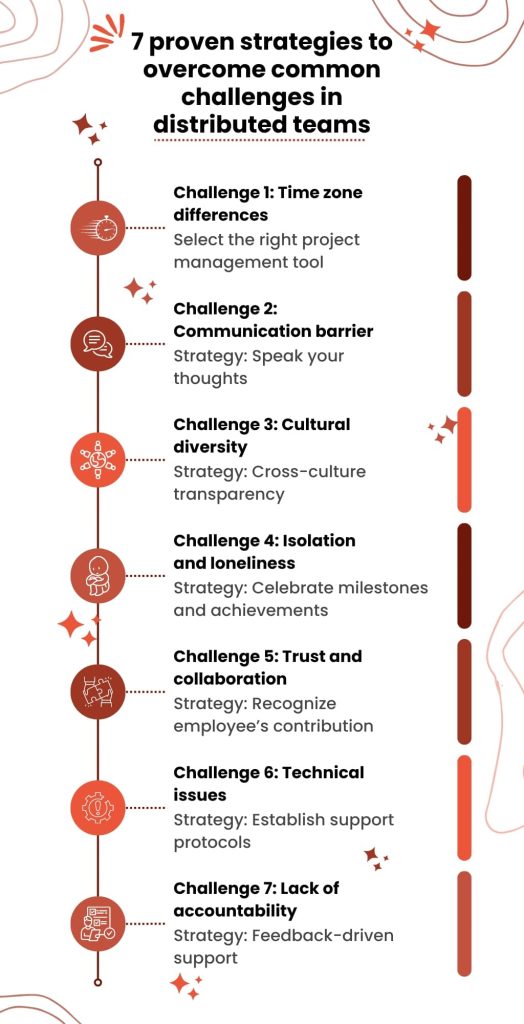Introduction
In the modern business landscape where hybrid work has become a trend, it’s clear that there will be the sustainability of a distributed workforce. While remote working comes with work-life balance and other benefits, it also gives birth to a few challenges.
Imagine trying to lead excellent minds from different time zones and locations. You will have to juggle assigning their responsibilities, getting reports, trusting their commitments, and monitoring their performance. That can be stressful and affect productivity.
If you are experiencing the same, you are not alone. In this blog, we are going to talk about seven proven strategies for overcoming regular challenges in distributed teams. From maintaining a healthy work environment to time management, we will try to cover almost every major challenge and also know the solution to make your hybrid team productive.
Let’s get started…
Read more: Choosing the best remote team management software for your business
7 Proven strategies to overcome common challenges in distributed teams
While remote teams take advantage of cost savings, increased flexibility, and access to a better work-life balance, they also face their own challenges. Here are seven common challenges and strategies along with challenges:

Challenge 1: Time zone differences
The difference in time zones demands extra effort and time to delegate tasks equally. It creates a challenge to communicate in real-time, conduct meetings, coordinate, and so forth.
Strategy: Choose suitable tools / project management tool
Asynchronous communication is an effective way to resolve this challenge. This entails applying methods such as using project management tool, calendar, and instant messenger tools to share status, discuss tasks, and make decisions during working hours. Since team members can go through the given information, asynchronous communication can be constructive in managing productivity and collaboration in teams that are spread geographically.
Challenge 2: Communication barrier
Unclear messages, miscommunication, and confusion are part of the communication barrier challenge. It typically occurs when team members struggle to communicate and understand the given information. It leads to misunderstanding and reduced teamwork.
Strategy: Foster open communication/speak your thoughts
Promote free and open communication where everyone can speak their thoughts, contribute ideas, and express their concerns freely. It can be done using video calls and messaging tools that foster open communication. This way, the inefficient information flow will be adjusted to good communication, which results in the elimination of communication barriers.
Challenge 3: Cultural diversity
Cultural differences can become a problem when working in multicultural teams and may cause misunderstandings, conflicts, and even delays in project implementation.
Strategy: Cross-culture transparency / encourage cultural practices
To address these challenges, culture change is needed, which would promote a culture of diversity and flexibility. It is suggested that employees should be encouraged to discuss their cultural practices and orientation as much as possible. Regular virtual meetings and open communication are the definite solutions for this challenge.
Challenge 4: Isolation and loneliness
It happens when employees feel disconnected from the team due to location differences. This feeling leads to diminished job satisfaction and reduces engagement towards the work. It weakens team cohesion and decreases productivity.
Strategy: Celebrate milestones and achievements
The best strategy to overcome this challenge is to foster a communication culture, conduct daily/weekly video calls and virtual social events, and encourage team members to share their thoughts. Online coffee events and conducting team activities can help increase employee engagement and cheer them to stop feeling isolated.
Explore ahead: 8 ways to improve remote team dynamics
Challenge 5: Trust and collaboration
It is understandable that face-to-face interaction is necessary to trust a person working from a different location. Without interaction, It creates doubts about employees’ reliability and commitment. It is also a massive security concern regarding the company’s data.
Strategy: Regular check-ins
Implementing virtual meetings on a specific interval can help. Focusing on task management and monitoring daily progress can resolve this issue. In short, you have to maintain transparency in work and project progress. Giving clear goals and recognizing each employee’s contribution to work can also build trust and enhance collaboration.
Challenge 6: Technical issues
Inconsistent internet speed, connectivity problems, and other technical issues may affect the project’s progress. It is a common but effective challenge that occurs when managing a distributed team.
Strategy: Establish support protocols
Provide a backup communication channel so that employees can discuss their technical failures. Get a dedicated IT support teammate who can access the individual’s system and software to troubleshoot the issue. Also, you can provide training for troubleshooting common technical problems during onboarding.
Challenge 7: Lack of accountability
It arises when team members work without a clear vision, which leads to missed deadlines and incomplete tasks. This creates hurdles for managers to ensure that the team stays on task and meets deadlines with direct supervision.
Strategy: Feedback-driven support
Discuss the task with the employee before they start working. Provide an uninterrupted communication path so employees can connect with you whenever they need support. Ask your team to submit a daily work report to analyze the project’s process and areas of improvement.
Enhance your knowledge: 9 Challenges of hybrid working and how you should tackle them
Conclusion
In today’s rapidly growing industry where remote work becomes typical, every team leader or manager must know how to deal with challenges occurring in a distributed team. Thus, above mentioned steps described in the blog, gives you an opportunity to create a positive attitude in your team and achieve effective collaboration among your employees.
These best practices ranging from communication and cultural awareness to trust and technical skills will assist you in solving the problems associated with remote work, enabling your team to achieve its objectives. Remember, that a properly trained distributed team can be as productive and efficient.

















No Comments